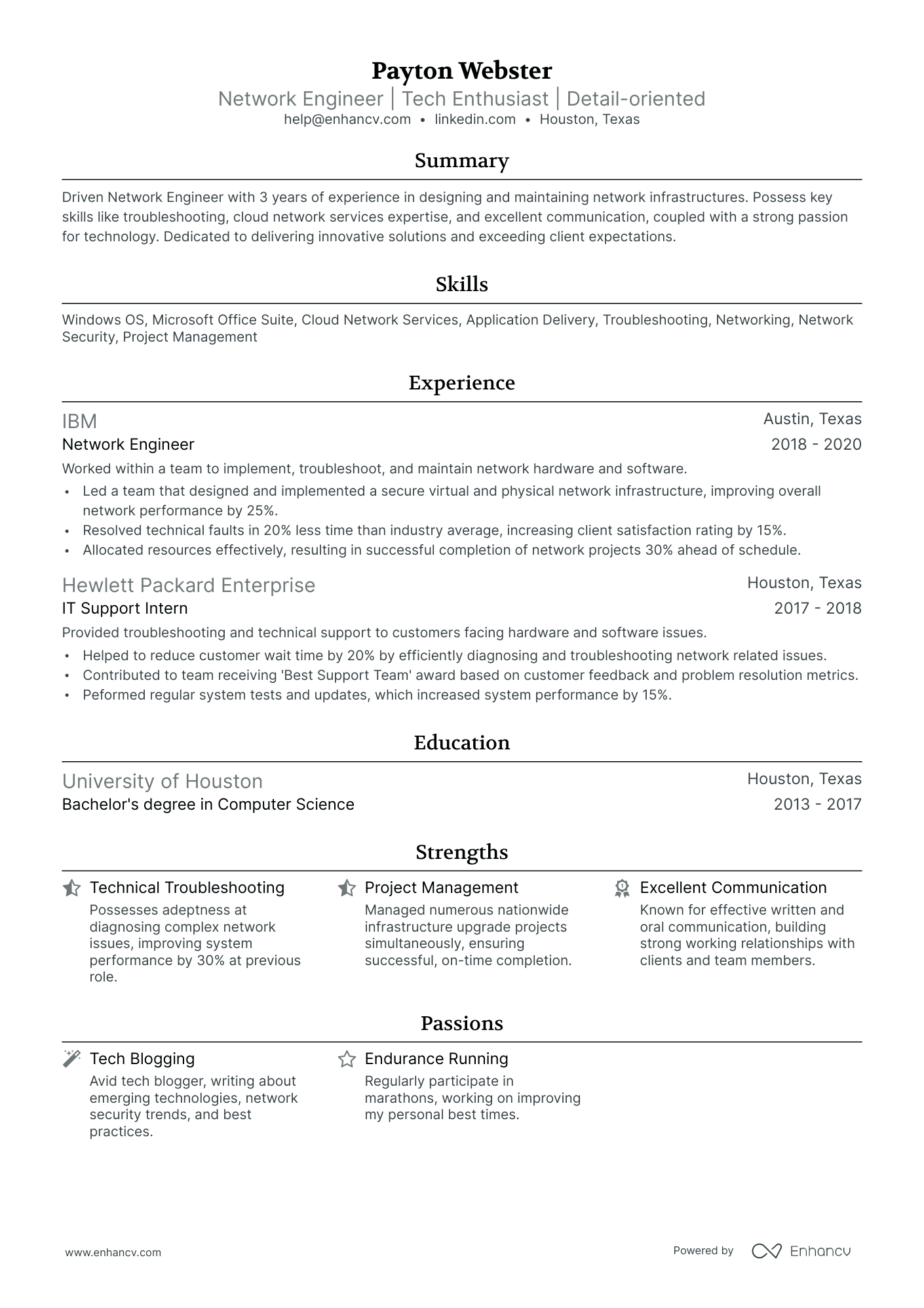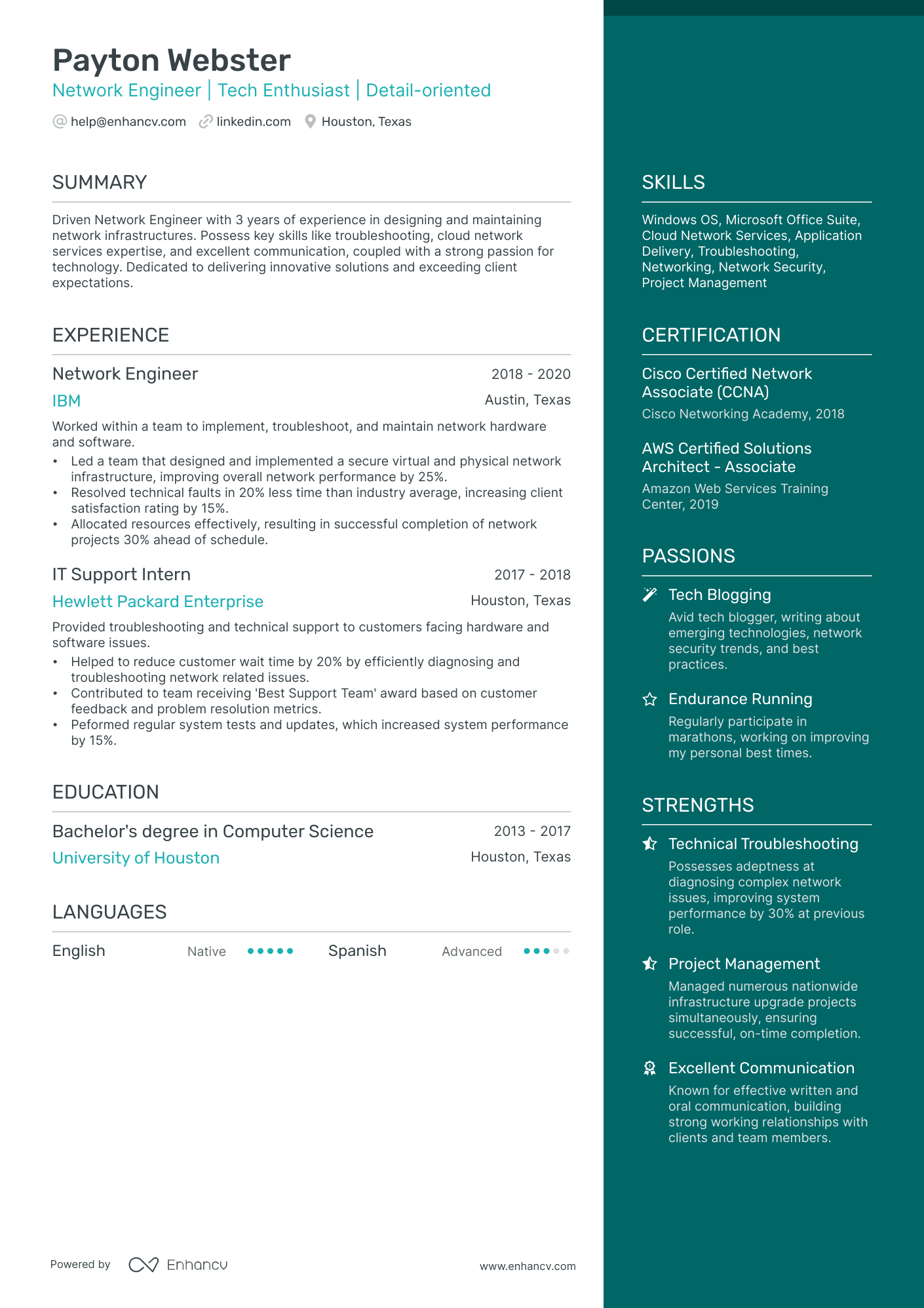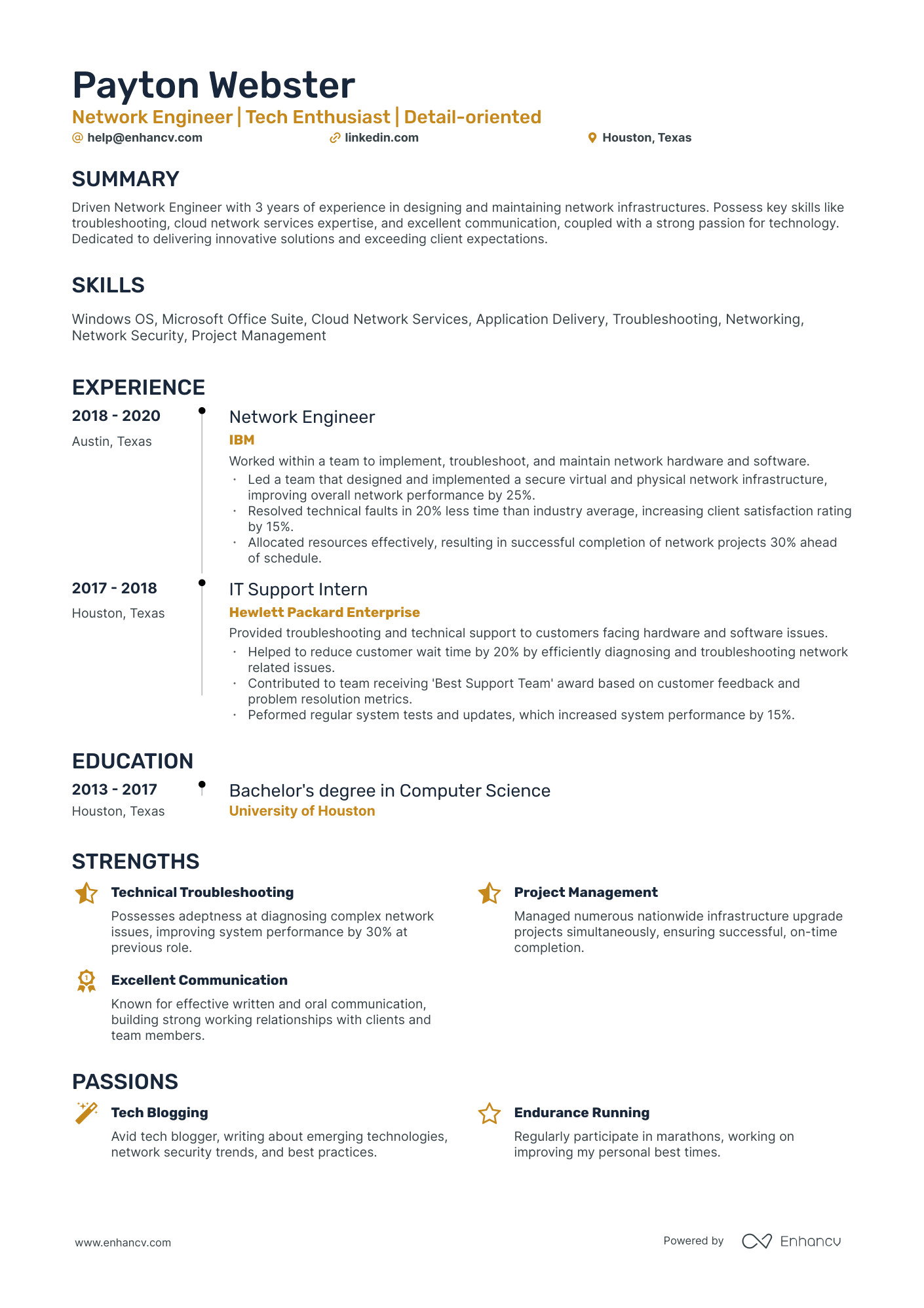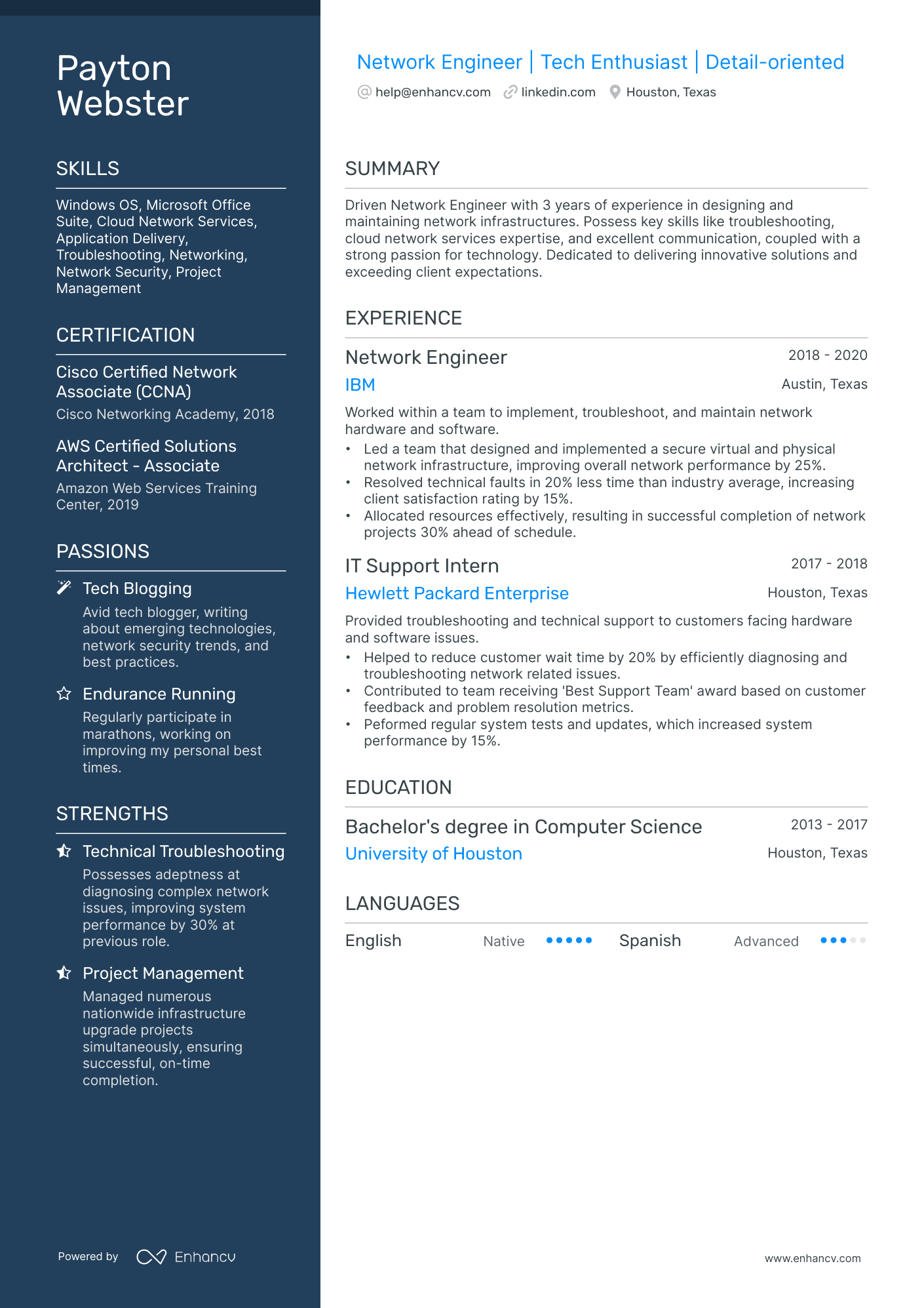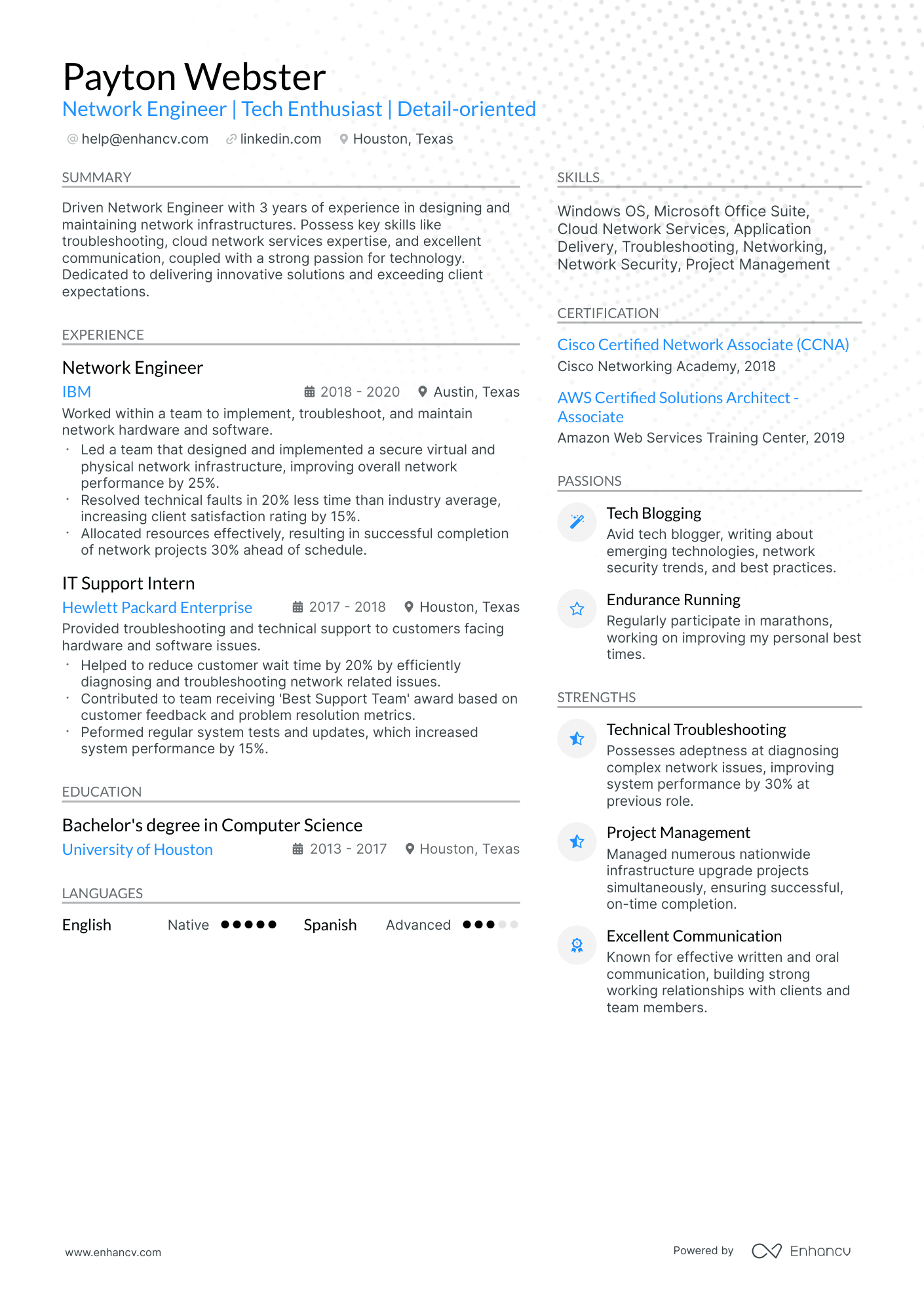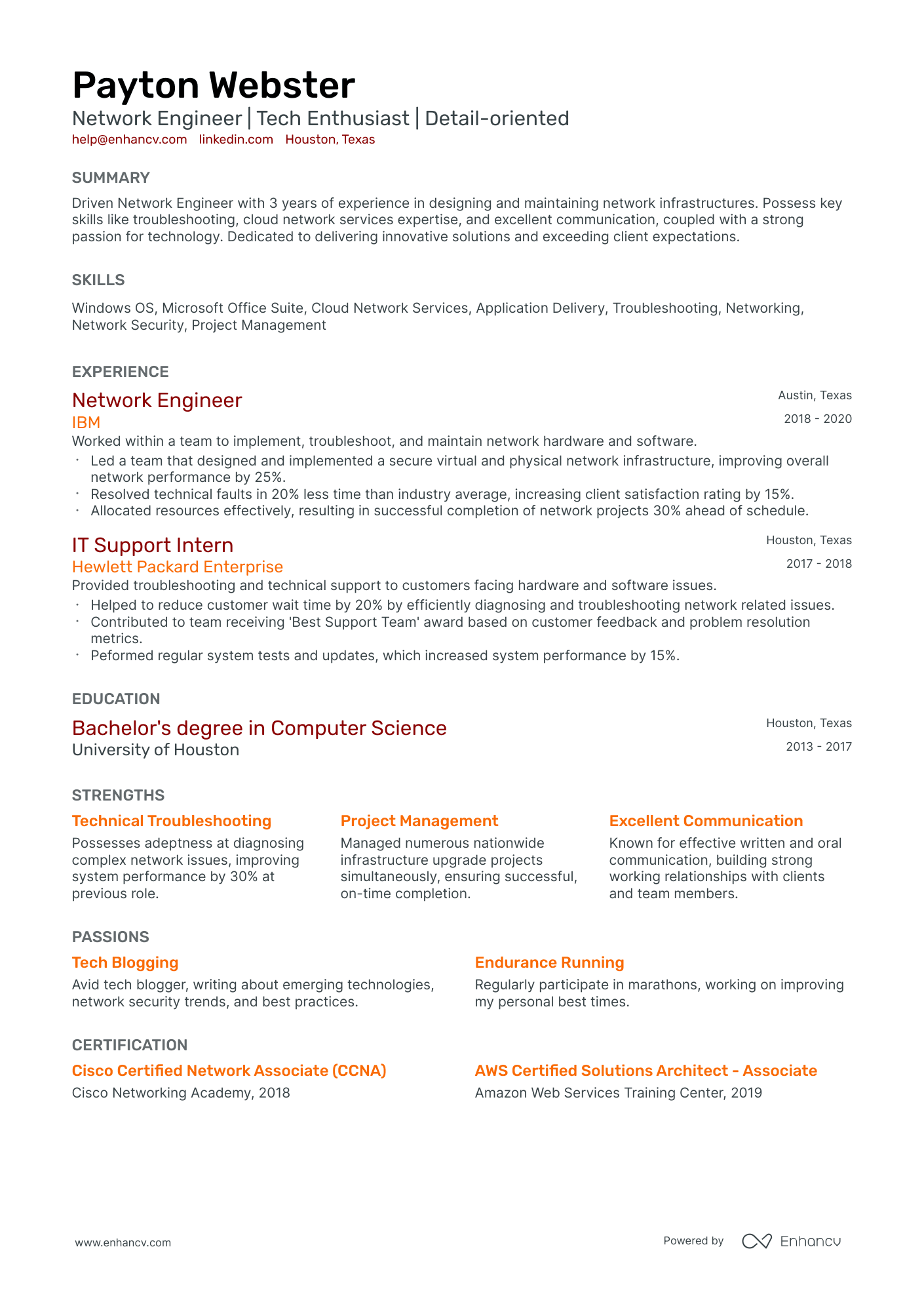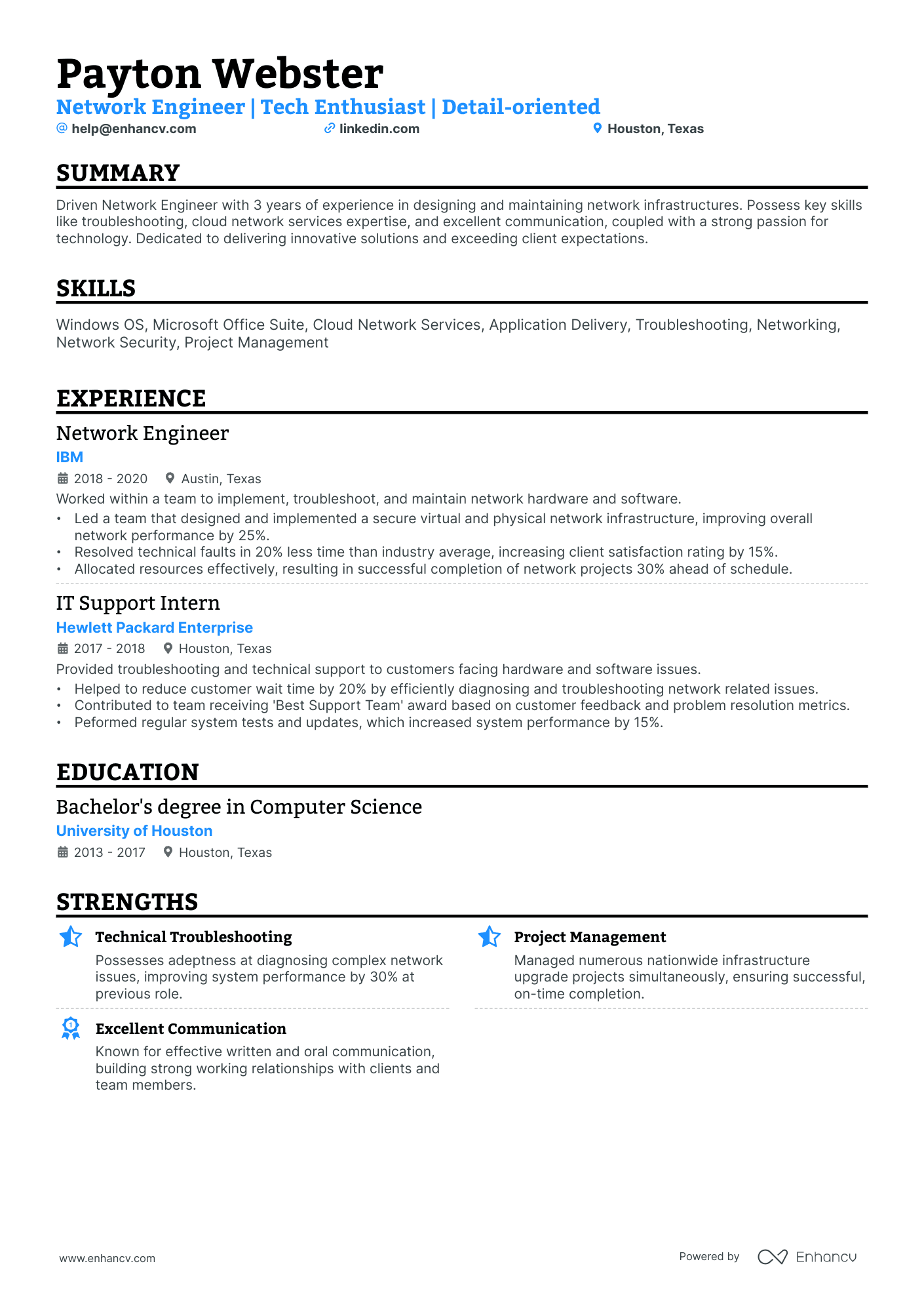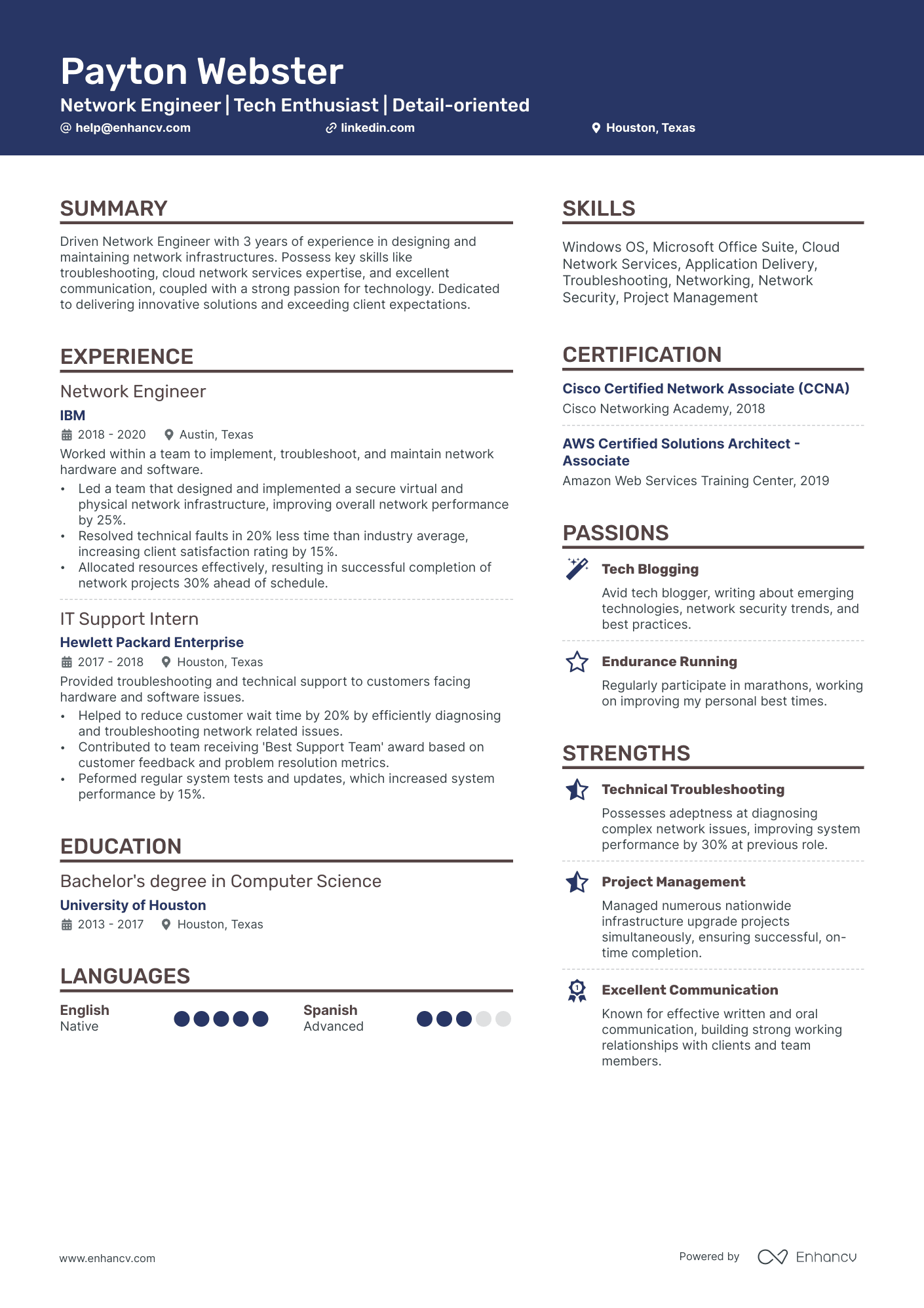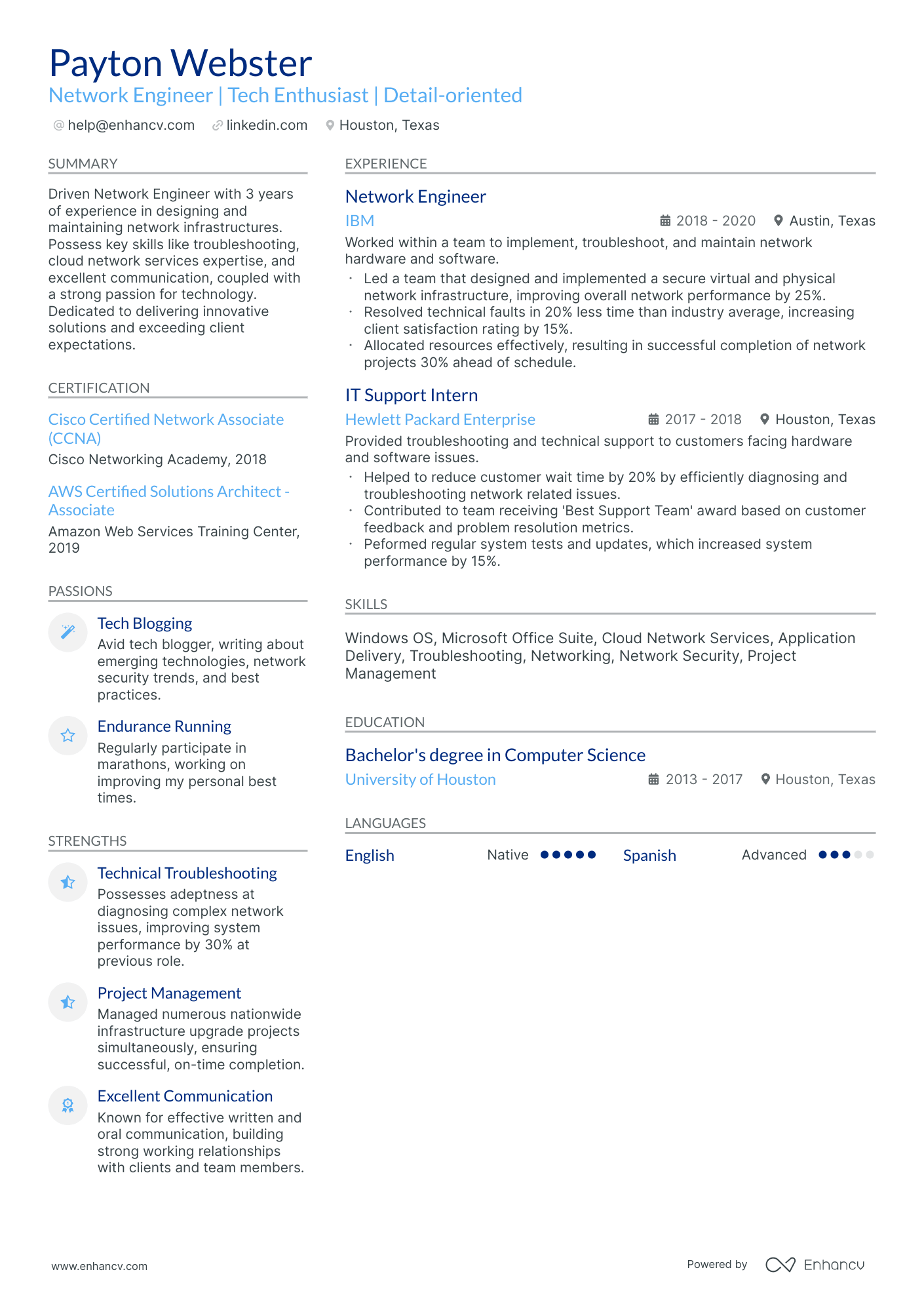A common challenge faced by junior network engineers is articulating their technical skills and project experiences coherently in a resume, as they often lack extensive professional work experience. Our guide assists in overcoming this hurdle by providing clear examples of how to effectively detail relevant coursework, lab projects, internships, or certifications, thereby showcasing the potential for success in a network engineering role.
Stay tuned for more ideas on how to write your junior network engineer resume:
- Find different junior network engineer resume examples to serve as inspiration to your professional presentation.
- How to use the summary or objective to highlight your career achievements.
- How to create the experience section to tell your story.
- Must have certificates and what to include in the education section of your resume.
Recommended reads:
Tips for refining your junior network engineer resume format
The resume format sets the stage for your professional narrative. Ensure it:
- Adopts the reverse-chronological format, placing your most recent experiences at the forefront. This format is ideal for those with relevant and up-to-date experience.
- Features a clear headline, making it straightforward for recruiters to access your contact details, portfolio, or current role.
- Stays concise, ideally spanning no more than two pages, focusing on relevant experiences and skills.
- Maintains its layout by being saved as a PDF, ensuring compatibility with Applicant Tracking Systems (ATS).
Targeting Canada? – Keep in mind their resume layout may differ from others.
Upload your resume
Drop your resume here or choose a file. PDF & DOCX only. Max 2MB file size.
Pro tip
Your resume will likely be processed by an Applicant Tracking System (ATS). Ensure your header, summary, or objective incorporates essential skills required for the role.
Don't forget to include these six sections on your junior network engineer resume:
- A header for your contact details and a summary that highlight your alignment with the junior network engineer job you're applying for
- An experience section that explains how you apply your technical and personal skills to deliver successful results
- A skills section that further highlights how your profile matches the job requirements
- An education section that provides your academic background
- An achievements' section that mentions any career highlights that may be impressive, or that you might have missed so far in other resume sections
What recruiters want to see on your resume:
- Networking Skills: Demonstrable skills in managing, maintaining, and troubleshooting computer networks including proficiency with networking protocols, hardware, and software.
- Certifications: Relevant industry certifications like CCNA, CompTIA Network+, or Juniper JNCIA which shows your commitment to the field and a standardized level of knowledge.
- Hands-On Experience: Previous work experience or internships related to networking that highlight practical application of your skills, even if limited.
- Problem Solving: Evidence of analytical thinking and problem-solving abilities applied in real-world situations, specifically related to complex network issues.
- Teamwork and Communication: Ability to effectively work within a team and communicate technical information to non-technical staff members or clients.
Recommended reads:
Optimizing your junior network engineer resume experience section
Your resume's experience section should resonate with your accomplishments while aligning with the job's demands. Here's how:
- Highlight significant career moments, and back them up with relevant skills.
- Analyze the job description to address both basic and advanced requirements.
- If you have unrelated roles, consider a separate section, but emphasize transferable skills.
- Avoid listing roles from over a decade ago unless they showcase your trajectory, especially for senior roles.
- Illustrate how your contributions enhanced the team or company, linking challenges to solutions.
Review how seasoned junior network engineer professionals have crafted their experience sections, emphasizing their contributions.
- Designed and implemented network solutions, resulting in a 20% increase in network performance.
- Managed and maintained Cisco switches and routers, ensuring optimal network functionality.
- Configured and troubleshooted VLANs and ACLs to enhance network security.
- Collaborated with cross-functional teams to deploy new network infrastructure for a large-scale office expansion project.
- Performed network monitoring and analysis, identifying and resolving network issues to minimize downtime.
- Assisted in the design and implementation of a unified communication system, integrating voice and data networks.
- Upgraded network equipment, resulting in a 30% improvement in network speed and reliability.
- Provided technical support to end-users, troubleshooting network connectivity and configuration problems.
- Implemented network security protocols, including firewalls and intrusion detection systems, reducing cybersecurity risks.
- Planned and executed network hardware upgrades, resulting in a 40% increase in overall network capacity.
- Collaborated with vendors to procure network equipment, ensuring timely delivery and cost efficiency.
- Participated in disaster recovery planning and conducted regular network backups to safeguard critical data.
- Designed and administered network infrastructure for a cloud-based environment, supporting over 500 virtual servers.
- Optimized network performance by implementing load balancing and traffic management techniques.
- Developed and maintained network documentation, including diagrams, configurations, and standard operating procedures.
- Conducted network capacity planning and recommended hardware upgrades to support business growth.
- Managed network projects from initiation to completion, ensuring adherence to deadlines and budget constraints.
- Configured and maintained wireless networks, enabling seamless connectivity across multiple office locations.
- Implemented network monitoring tools, resulting in proactive identification and resolution of network issues.
- Collaborated with vendors and negotiated service contracts to optimize network support and maintenance services.
- Designed and implemented secure remote access solutions, enabling remote workforce connectivity.
- Performed network vulnerability assessments and recommended security enhancements based on findings.
- Assisted in the migration of network infrastructure to a software-defined networking (SDN) architecture.
- Provided training and guidance to junior engineers on network troubleshooting and best practices.
- Installed and configured network equipment, including routers, switches, and wireless access points.
- Managed network cabling infrastructure, ensuring adherence to industry standards and best practices.
- Performed routine network maintenance tasks, such as patch management and firmware upgrades.
- Collaborated with IT teams to develop disaster recovery plans and implement backup solutions.
- Designed and implemented secure site-to-site VPN connections, enabling secure communication between multiple office locations.
- Configured and maintained network monitoring tools, proactively identifying and resolving network performance issues.
- Upgraded network infrastructure to support Voice over IP (VoIP) technology, improving communication efficiency.
- Provided technical guidance and support for network-related incidents, ensuring timely resolution and minimal impact.
- Deployed and managed network segmentation strategies to enhance network security and protect sensitive data.
- Implemented Quality of Service (QoS) policies to optimize network performance for critical applications.
- Conducted network performance analysis and recommended infrastructure improvements to meet evolving business needs.
- Collaborated with cross-functional teams to plan and execute network maintenance activities without impacting operations.
- Designed and implemented redundant network architectures to ensure high availability and minimize downtime.
- Implemented network access control measures, including authentication and authorization mechanisms.
- Managed network troubleshooting and provided timely resolution to minimize impact on business operations.
- Collaborated with vendors for hardware procurement and negotiated favorable pricing terms.
Quantifying impact on your resume
<ul>
Strategies for candidates with limited or no experience
Even if you're light on experience, other facets of your junior network engineer resume can resonate with job requirements:
- Education: Detail skills acquired that dovetail with job expectations.
- Internships & Temporary Roles: Spotlight roles that underscore your relevant expertise.
- Skills: Address both foundational and nuanced job qualifications.
- Strengths & Achievements: Illuminate the distinct value you bring, even if you're newer to the industry.
Recommended reads:
Pro tip
Boost your resume by focusing on the practical aspects of each job requirement. While it's good to have job-related keywords on your resume, ensure they're backed by action verbs and quantifiable data. This gives recruiters a clear picture of your junior network engineer professional journey.
Junior network engineer resume skills: showcasing both hard and soft skills
Your junior network engineer resume should show recruiters your range of skills. List the tools and software you use (hard skills) and how they fit into your daily tasks. But don't stop there. Share the personal traits (soft skills) you've gained from your experiences. Here's how:
- Showcase three top career achievements.
- For each achievement, mention a hard and a soft skill you used.
- Highlight unique skills that set you apart.
- Discuss how your skills improved the workplace or team culture.
Check our list for popular hard and soft skills in the industry.
Top skills for your junior network engineer resume:
Cisco Networking
TCP/IP
Subnetting
Routing Protocols (e.g., OSPF, EIGRP)
Switching Technologies
Network Security Basics
Firewall Configuration
Network Monitoring Tools (e.g., Wireshark, SolarWinds)
VPN Configuration
Basic Scripting (e.g., Python, Bash)
Problem Solving
Communication
Teamwork
Adaptability
Attention to Detail
Time Management
Critical Thinking
Customer Service Orientation
Analytical Skills
Willingness to Learn
Pro tip
When detailing your skills, align them with the job's requirements. Emphasize unique technical proficiencies and provide examples of your soft skills in action.
Highlighting certifications and education on your junior network engineer resume
Your academic achievements, including certifications and degrees, bolster your application. They showcase your skills and commitment to the field.
To effectively present these on your resume:
- Highlight significant academic achievements or recognitions relevant to the role.
- Be selective; prioritize the most relevant and impressive certifications.
- Include essential details: certificate/degree name, institution, graduation dates, and license numbers (if applicable).
- Present your academic background in reverse chronological order, emphasizing the most recent and relevant qualifications.
For further guidance, explore popular industry certifications.
Best certifications to list on your resume
Pro tip
If you're in the process of obtaining a certification listed in the job requirements but haven't completed it yet, be transparent. Mention your ongoing training and the expected completion date. Honesty is always the best policy on a resume.
Recommended reads:
Summary or objective: maximizing the impact of the top third of your resume
The top third of your junior network engineer resume is crucial. It's often the first thing recruiters see and can set the tone for the rest of your application.
Whether you choose a resume summary or a resume objective, make it count. The former is great for showcasing career highlights, while the latter balances your achievements with your future aspirations.
Both should be tailored to the role, as there's no universal approach to crafting the perfect junior network engineer summary or objective. Use the examples below as a starting point.
Resume summary and objective examples for a junior network engineer resume
Optimize your resume summary and objective for ATS
Drop your resume here or choose a file.
PDF & DOCX only. Max 2MB file size.
Additional junior network engineer resume sections for a personalized touch
To further personalize your junior network engineer resume, consider adding sections that reflect your unique qualities and achievements.
Popular choices include:
- Projects to showcase significant work achievements.
- Languages to indicate proficiency levels.
- Awards to celebrate industry recognitions.
- Hobbies and Interests to share personal passions.
Key takeaways
- Effective junior network engineer resumes are well-structured, weaving a compelling career narrative.
- Choose between a resume summary or objective based on your experience and the impression you aim to create.
- If lacking in direct experience, leverage other roles, such as internships or contract positions, to demonstrate alignment with the junior network engineer role.
- Be discerning in listing hard and soft skills, ensuring relevance and showcasing outcomes.
- Always tailor your resume for each junior network engineer application, ensuring alignment with job requirements.
